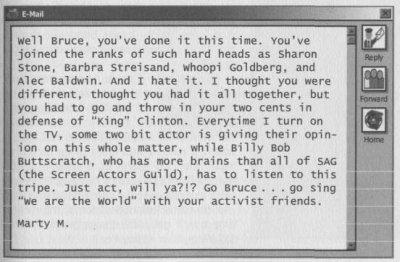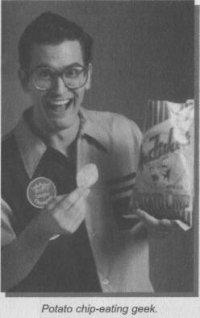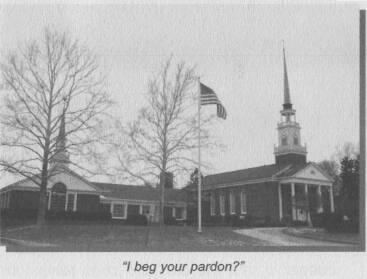Read If Chins Could Kill: Confessions of a B Movie Actor Online
Authors: Bruce Campbell
Tags: #Autobiography, #United States, #General, #Biography & Autobiography, #Biography, #Entertainment & Performing Arts - General, #Entertainment & Performing Arts, #Actors, #Performing Arts, #Entertainment & Performing Arts - Actors & Actresses, #1958-, #History & Criticism, #Film & Video, #Bruce, #Motion picture actors and actr, #Film & Video - History & Criticism, #Campbell, #Motion picture actors and actresses - United States, #Film & Video - General, #Motion picture actors and actresses
If Chins Could Kill: Confessions of a B Movie Actor (28 page)

Then there were the
other
reviews -- the ones that made you want to crawl into a hole and die. I joined
Evil Dead
in Los Angeles for the
Filmex
festival. Fielding questions after the screening, the first inquiry put it all in perspective: "So, Bruce, are you going to use
real
actors next time?"
More pot shots came from various reviews around the country. "Sickest of the Sick" was Atlanta's description of the film. "Films that Stoop" headlined another entertainment review. After getting almost universal praise for
Evil Dead,
I suppose it was the balance we needed.
EVIL DEAD
FOOTNOTE
All in all, our investors got their money back after six years. Nineteen years later, due to a built-up demand, we were back on the video charts at number three -- right behind
Titanic
and
Lady and the Tramp.
I fear for that buried time capsule -- its days are numbered. I recently attended a film festival in Champagne/Urbana, Illinois. At a "meet and greet" session, a rock was plunked down in front of me -- a craggy, toothlike rock similar to that used in the construction of...
the fireplace of our cabin!
Bruce: Where the flyin' hell did you get this?
Fan: Your cabin was in Morristown, Tennessee, right?
Bruce: (warily)... Yeah ...
Fan: Well, we went there and found it. The fireplace was the only thing that was standing.
He was right, the place burned down in late 1980. Over the years, this obscure cabin in the hills has become a mecca of sorts for the truly devoted. I did my best to dodge various e-mails and letters from Deadites (an affectionate term), asking where they might find this mythical cabin, but my efforts have come to naught. The word is out.
27
WORKING IN THE INDUSTRY:
BC BECOMES AN ACTOR
I'm a little fuzzy on when I officially declared myself an actor. I had been exposed on film for ten years, with varying success, but I never made a living at it -- and by Detroit standards, I couldn't say I was an actor until I could.
While
Evil Dead
was in post-production, there was a rushed trip to New York to audition for a romantic comedy. The project was hardly worth the plane fare, but try and tell that to a young actor with no perspective.
I cohosted a "pilot" for an automotive talk show. The Motor City seemed like a logical place to film such a thing, but nothing ever came of it.
During a sales trip to Los Angeles, I met with a manager for the first time and showed him some clips from the film.
"I think you could be a star, but you need to lose some weight," was his only assessment -- the fact that I still lived in Detroit didn't help either.
What came of that meeting was the need for a head shot -- an eight-by-ten black-and-white photograph that best represented what I was all about. This was an alien concept for me, since I had never "marketed" myself before. What kind of an actor
was
I? A
funny
actor? A
serious
actor? A
character
actor?
In Detroit, talent agencies solved that problem by insisting that clients create a composite photo that showcased your versatility. To prepare for this, I looked at other "comps." If you're ever in need of great entertainment, go to a talent agency and thumb through their stack of "Construction Workers," "On The Go Executives," and "Happy Home-makers."
A trip to Mike Ditz's photo studio put the pictures in motion. There, I'm embarrassed to admit, I allowed myself to be photographed as the "unshaven, shirtless stud," the "slick, James Bond-like dude," and the "bespectacled, potato chip-eating geek."
I'm not sure if these photos helped or hindered me, but at least I was ready to be submitted. One of my first bites from the outside world was a role in a promotional commercial for a Detroit TV station. Okay, it wasn't a
role --
I was hired to be an extra. Mind you, an extra in a ninety-minute feature film has a chance of being seen -- an extra in a sixty-second commercial might as well do cartwheels naked for all the screen time they'll get. Still, I was happy for the 1.5 seconds of exposure.
After several auditions, I managed to land the role of teacher, Alan Stuart, in a homegrown soap opera called
Generations.
The basic scenario was no different than the average soap -- a bunch of upscale people enduring never-ending personal problems. It wasn't exactly Harold Pinter, but they were paying thirty-five bucks a scene -- thirty-five more than I had ever made before.
The only lasting benefit of doing this soap (other than paying off my Sunoco credit card) was learning to memorize lines of dialogue quickly and meeting an actress named Christine Deveau. She played my love interest on the show and, to perpetuate an old cliché, we became involved off screen as well.
I must admit, what attracted me most to Cris was her attraction to me. Simplistic, yes, but this was the first time a woman had openly expressed an interest, and I responded in kind.
Having been married before, Cris had first hand knowledge of things like "long-term commitment" and "co-habitation," but it was all Greek to me. Until Cris appeared on the scene, the film business was my only mistress, demanding full attention. Now, I had to divide my time more equally.
Waking up next to the same person each morning and coming home to them every night was an exciting dynamic and it felt very comfortable. Within six months, talk of the big "M" peppered our conversations.
Because marriage is such a personal affair, Cris and I felt that we alone should determine every aspect of the process -- including when, where and how it should take place. As a result, we shocked the daylights out of Reverend Cowick at our first meeting at the Franklin Community Church.
Rev: It's so nice to have you two here. I am really looking forward to --
Bruce: Yeah, uh, Rev, could you marry us right now?
Rev: I beg your pardon?
Cris: We have everything with us.
Rev: Well, I...
Bruce: Could you? Right here?
Rev: But I don't even know you.
Bruce: With all due respect, Reverend, you never will. This is between the two of us and the Big Guy upstairs.
Reverend Cowick remained unconvinced, however, and encouraged us to have a "proper" ceremony.
I had been in the Franklin Village Church many times, rehearsing with the Franklin Village Junior Players. While fine-tuning a talent show in 1973, the contestants took a short break to watch Richard Nixon resign. Ten years later, I was there for something far more important than politics -- I was about to close the door on bachelorhood.
The ceremony on March 13, 1983, was as small as possible. We managed to pare participation down to a witness and a ring bearer. Rob and Sam made for dual Best Men/witnesses and Sam's mother, Celia, presented the ring because if she wasn't allowed to attend, she swore she'd never speak to me again. Having endured her loving wrath for years at the Raimi household, I knew she was dead serious. The wedding went off without a glitch, and the Michigan weather gods provided us with a warm, sunny day.
By the time Cris and I tied the knot, the soap opera,
Generations,
had been cancelled. In an ironic twist, years after my marriage collapsed, this tragically poor soap lived on. Watch closely to a scene in the Coen Brother's film
Fargo,
where a bad guy is glued to the TV in a cabin. There, in poor reception, you can see me arguing with my "girlfriend." Screen time in an Academy Award-winning film -- what more could a guy from Detroit want?
My next gig came from an ex-employer. Ron Teachworth, a teacher for whom I taught film classes, decided to pony up his own money and make a film -- what resulted was the independent feature,
Going Back.
Up to this time, I had mastered the prolonged scream, the horrific recoil, the slam against a wall, but I never really had to do what would be considered
acting.
Going Back
was fun because there wasn't an ounce of blood anywhere in sight -- just a strange thing called dialogue. Method acting and I are strange bedfellows, but it was refreshing to rehearse scenes, just like a play, and shoot them simply and efficiently.
The entire film was shot in two weeks in the middle part of Michigan. The beauty of having next to no budget is that the cast and crew remain small. By the time I was done filming, I knew each person by name and whether they snored or not, since most of us bunked in a single trailer home.
Okay, so I starred in a couple films, and bluffed my way through a go-nowhere soap opera. So what? I still wasn't a member of the Screen Actors Guild -- the Holy Grail of "professional" validation.
The great wheel of Karma rolled back around as I attended an audition for a Chrysler Industrial film. The producer was a fellow I knew from my production assistant days. In fact, my 1973 Chevy Bel Air had been towed as an abandoned vehicle while under his employ, and I suppose he felt sorry for me.





